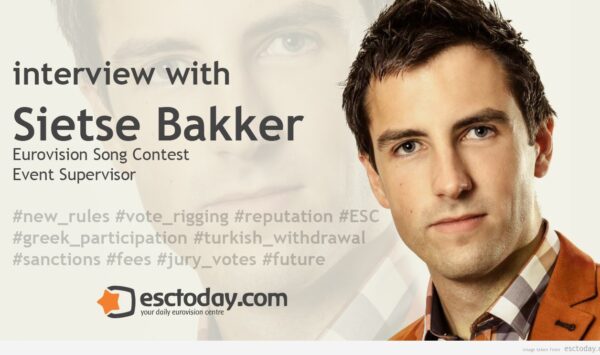Lately the Eurovision Song Contest management have been standing in the eye of the storm. Allegations of vote buying and rigging, tampered jury results, countries withdrawing and the contest experiencing the most severe crisis in its history.
We managed to have a conversation with Sietse Bakker, the contest’s Event Supervisor, and we got the chance to get answers to all the current burning issues around the Eurovision Song Contest. We asked Mr. Bakker about the allegations of the rigged tele-vote and jury vote, for human rights, ERT (Greek broadcaster) shutdown as well as the future plans of the contest.
Today we publish the second and final part of the exlusive interview with Sietse Bakker.
Withdrawing countries and participation fees
Last year, some countries withdrew. The cost of participating in ESC is becoming more and more of an issue for the broadcasters, given the economic situation in Europe. Despite this, the fees were increased in 2013. Does the EBU have any plans to take any measures to make it more affordable not only for the host country?
Participation fees have been very stable over the past years. Because the host broadcaster doesn’t pay participation fee, which then has to be carried jointly by the other participating broadcasters, the fees are sometimes higher, sometimes lower. We very deliberately kept the fees relatively stable, to support our Members. At the same time, we find it important to support the host broadcaster, which is investing substantially. We’ve shortened the rehearsal schedule and put more focus on negotiating better hotel deals. But bottom line, each broadcaster gets 7,5 hours of high quality live entertainment, with the security of good to great ratings, for a reasonable price.
Regarding Turkey’s withdrawal last year from the Eurovision and its reluctance to return to the contest next year unless the EBU make changes in the 50/50 jury and tele-voting system and the Big5 rule, what is EBU’s standing concerning this issue? What actions is the EBU taking to bring Turkey back to the contest?
We’re always eager to have a dialogue with our Members when they consider or decide to pull out, and take their input very seriously. Keeping a healthy balance between the wishes of 40 broadcasters is a challenge; sometimes you can fulfill their wishes, sometimes you can’t. Unfortunately, TRT never informed us of their concerns before they pulled out, so it was a fait accompli. Rest assured that we are eager to get them back on board.
Vote rigging allegations / EBU’s reputation
Lately the EBU has suffered from attacks on its reputation, transparency and willingness to deal with burning issues directly. Many people see it as an organisation more willing to cover up problems, remaining silent or making excuses rather than choosing to act. What is your response to these growing concerns, and will the EBU intervene over ethical issues in future, and not just matters of rules and regulations?
The EBU has strong ethical values at its core. Our Members, through bodies like the General Assembly, the TV Committee and the Reference Group, are actually closely following what happens in the organisation! The EBU has a clear mandate from its Members within the field of public broadcasting, but cannot take on every social or political challenge. That is, in many cases, not our expertise either.
When it comes to the Eurovision Song Contest, we’ve been very eager to explain some of the challenges we face. We answer every single question we get from journalists, fans and viewers, and eventually came up with a set of new rules we are proud of. I dare to say that the Eurovision Song Contest team has never been as approachable as today.
Last May, the EBU revealed the split ranking per country of the shows. However, the detailed results were not made public, because “publishing these numbers would explicitly highlight if countries don’t meet the tele-voting threshold” and “could lead to unwanted disproportionate influence on the tele-voting in these countries in future years to come” [EBU]. On the other hand, in your interview with Skånska Dagbladet, you mentioned an intelligent system that could exclude suspicious votes. This week the EBU explained that next May the full split results will be revealed to the audience. Is there any particular reason for not disclosing the 2013 Eurovision split results?
Yes, we are very confident in the technology behind the televoting. At the same time, disclosing too much information about how this technology works could jeopardize the very success of it. With technology advancing as the call for transparency grows, we feel secure enough to implement these changes now.
The 2013 rules do not foresee in releasing the split results per country.
In the latest developments, major European media has been reporting on the alleged vote buying and vote rigging in 2013 Eurovision by certain countries, making headlines all over the continent which affect the credibility and the image of the Eurovision brand. How is the EBU handling this issue and what actions have been taken in order to solve this?
Media pressure is always challenging. We of course have procedures in place to adequately handle media inquiries, as well as protocols on how to deal with such allegations. We believe it is important to adequately investigate these allegations, which we have been doing over the course of summer and continue to do so. We do not want to rush into conclusions, but get as much information as possible on the table. In case any of these allegations are proven, our focus would first of all be on solving the problem, then it is up to the Reference Group to determine what kind of sanction should be imposed.
The Executive Supervisor of the Eurovision Song Contest, Mr. Jon Ola Sand, commented on the punishment over the vote rigging “First, this is not about punishing. For EBU/EUROVISION it`s important to find who is behind the alleged attempt, and if we find any wrongdoing […](the EBU) will impose sanctions according to the rules of the Eurovision Song Contest.“. Can you please specify what would these sanctions entail? If in the scenario where alleged countries accused in wrongdoings at the 2013 contest are found guilty, what would these countries be risking?
Each country is represented by its respective public broadcaster, which is signing the rules. This is effectively an agreement between the EBU and its Member. In case a Member is in breach of those rules, the Reference Group can determine a sanction that varies from a formal warning, to a penalty, and even one to three years’ exclusion from participating in the contest. Such sanction has to be approved by the TV Committee as well.
Does a small jury size increase the danger of voting scandals, and would a larger jury size prevent this from happening so easily in future? Is it really feasible to eradicate corruption 100%, given that the EBU cannot control absolutely everything that goes on behind closed doors? In light of this, what is the best compromise? Is it really possible to achieve 100% transparency?
We are confident with the way it works now; five music industry professionals, amongst them one chairman, monitored by a notary. We also send PWC representatives to the jury gatherings, all unannounced, to observe the procedure. A small jury allows each broadcaster to find top music industry professionals. The bigger the group, the harder to find those people. We aim for maximum openness, minimum space for corruption and strict implementation of the rules. If we find any wrongdoing, we will act.
esctoday.com would like to thank Sietse Bakker, the Eurovision Song Contest Event Supervisor for this interview.




